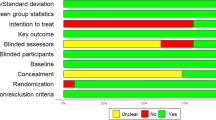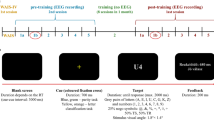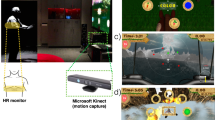Abstract
Cognitive control is defined by a set of neural processes that allow us to interact with our complex environment in a goal-directed manner1. Humans regularly challenge these control processes when attempting to simultaneously accomplish multiple goals (multitasking), generating interference as the result of fundamental information processing limitations2. It is clear that multitasking behaviour has become ubiquitous in today’s technologically dense world3, and substantial evidence has accrued regarding multitasking difficulties and cognitive control deficits in our ageing population4. Here we show that multitasking performance, as assessed with a custom-designed three-dimensional video game (NeuroRacer), exhibits a linear age-related decline from 20 to 79 years of age. By playing an adaptive version of NeuroRacer in multitasking training mode, older adults (60 to 85 years old) reduced multitasking costs compared to both an active control group and a no-contact control group, attaining levels beyond those achieved by untrained 20-year-old participants, with gains persisting for 6 months. Furthermore, age-related deficits in neural signatures of cognitive control, as measured with electroencephalography, were remediated by multitasking training (enhanced midline frontal theta power and frontal–posterior theta coherence). Critically, this training resulted in performance benefits that extended to untrained cognitive control abilities (enhanced sustained attention and working memory), with an increase in midline frontal theta power predicting the training-induced boost in sustained attention and preservation of multitasking improvement 6 months later. These findings highlight the robust plasticity of the prefrontal cognitive control system in the ageing brain, and provide the first evidence, to our knowledge, of how a custom-designed video game can be used to assess cognitive abilities across the lifespan, evaluate underlying neural mechanisms, and serve as a powerful tool for cognitive enhancement.
This is a preview of subscription content, access via your institution
Access options
Subscribe to this journal
Receive 51 print issues and online access
$199.00 per year
only $3.90 per issue
Buy this article
- Purchase on Springer Link
- Instant access to full article PDF
Prices may be subject to local taxes which are calculated during checkout




Similar content being viewed by others
References
Botvinick, M. M., Braver, T. S., Barch, D. M., Carter, C. S. & Cohen, J. D. Conflict monitoring and cognitive control. Psychol. Rev. 108, 624–652 (2001)
Dux, P. E. et al. Training improves multitasking performance by increasing the speed of information processing in human prefrontal cortex. Neuron 63, 127–138 (2009)
Foehr, U. G. Media multitasking among American youth: prevalence, predictors, and pairings. (Kaiser Family Foundation, 2006)
Gazzaley, A. in Principles of Frontal Lobe Function 2nd edn (eds D. T. Stuss & R. T. Knight ) Top-down modulation and cognitive aging. (Oxford Univ. Press, 2013)
Tucker-Drob, E. M. & Salthouse, T. A. Adult age trends in the relations among cognitive abilities. Psychol. Aging 23, 453–460 (2008)
Park, D. C. et al. Models of visuospatial and verbal memory across the adult life span. Psychol. Aging 17, 299–320 (2002)
Clapp, W. C., Rubens, M. T., Sabharwal, J. & Gazzaley, A. Deficit in switching between functional brain networks underlies the impact of multitasking on working memory in older adults. Proc. Natl Acad. Sci. USA 108, 7212–7217 (2011)
Verhaeghen, P., Steitz, D. W., Sliwinski, M. J. & Cerella, J. Aging and dual-task performance: a meta-analysis. Psychol. Aging 18, 443–460 (2003)
Erickson, K. I. et al. Training-induced plasticity in older adults: effects of training on hemispheric asymmetry. Neurobiol. Aging 28, 272–283 (2007)
Lussier, M., Gagnon, C. & Bherer, L. An investigation of response and stimulus modality transfer effects after dual-task training in younger and older. Front. Hum. Neurosci. 6, 129 (2012)
Zelinski, E. M. Far transfer in cognitive training of older adults. Restor. Neurol. Neurosci. 27, 455–471 (2009)
Gazzaley, A., Cooney, J. W., Rissman, J. & D'Esposito, M. Top-down suppression deficit underlies working memory impairment in normal aging. Nature Neurosci. 8, 1298–1300 (2005)
Greenberg, L. M. T.O.V.A. Continuous Performance Test Manual. (The TOVA company, 1996)
Onton, J., Delorme, A. & Makeig, S. Frontal midline EEG dynamics during working memory. Neuroimage 27, 341–356 (2005)
Sauseng, P., Hoppe, J., Klimesch, W., Gerloff, C. & Hummel, F. C. Dissociation of sustained attention from central executive functions: local activity and interregional connectivity in the theta range. Eur. J. Neurosci. 25, 587–593 (2007)
Nigbur, R., Ivanova, G. & Sturmer, B. Theta power as a marker for cognitive interference. Clin. Neurophysiol. 122, 2185–2194 (2011)
Dahlin, E., Nyberg, L., Backman, L. & Neely, A. S. Plasticity of executive functioning in young and older adults: immediate training gains, transfer, and long-term maintenance. Psychol. Aging 23, 720–730 (2008)
Mitchell, D. J., McNaughton, N., Flanagan, D. & Kirk, I. J. Frontal-midline theta from the perspective of hippocampal ‘theta’. Prog. Neurobiol. 86, 156–185 (2008)
Buckner, R. L., Andrews-Hanna, J. R. & Schacter, D. L. The brain's default network: anatomy, function, and relevance to disease. Ann. NY Acad. Sci. 1124, 1–38 (2008)
Grady, C. L., Springer, M. V., Hongwanishkul, D., McIntosh, A. R. & Winocur, G. Age-related changes in brain activity across the adult lifespan. J. Cogn. Neurosci. 18, 227–241 (2006)
Scheeringa, R. et al. Frontal theta EEG activity correlates negatively with the default mode network in resting state. Int. J. Psychophysiol. 67, 242–251 (2008)
Damoiseaux, J. S. et al. Reduced resting-state brain activity in the ‘default network’ in normal aging. Cereb. Cortex 18, 1856–1864 (2008)
Strobach, T., Frensch, P. A. & Schubert, T. Video game practice optimizes executive control skills in dual-task and task switching situations. Acta Psychol. (Amst.) 140, 13–24 (2012)
Boot, W. R., Kramer, A. F., Simons, D. J., Fabiani, M. & Gratton, G. The effects of video game playing on attention, memory, and executive control. Acta Psychol. (Amst.) 129, 387–398 (2008)
Dye, M. W., Green, C. S. & Bavelier, D. Increasing speed of processing with action video games. Curr. Dir. Psychol. Sci. 18, 321–326 (2009)
Berry, A. S. et al. The influence of perceptual training on working memory in older adults. PLoS ONE 5, e11537 (2010)
Smith, G. E. et al. A cognitive training program based on principles of brain plasticity: results from the improvement in memory with plasticity-based adaptive cognitive training (IMPACT) study. J. Am. Geriatr. Soc. 57, 594–603 (2009)
Wolinsky, F. D., Vander Weg, M. W., Howren, M. B., Jones, M. & Dotson, M. M. A randomized controlled trial of cognitive training using a visual speed of processing intervention in middle aged and older adults. PLoS ONE 8, e61624 (2013)
Ball, K. et al. Effects of cognitive training interventions with older adults: a randomized controlled trial. J. Am. Med. Assoc. 288, 2271–2281 (2002)
Owen, A. M. et al. Putting brain training to the test. Nature 465, 775–778 (2010)
Macmillan, N. A. & Creelman, C. D. Detection Theory: A User's Guide. 2nd edn (Lawrence Erlbaum Associates, 2005)
Knapp, T. R. & Schafer, W. D. From Gain Score t to ANCOVA F (and vice versa). Pract. Assess. Res. Eval. 14, 6 (2009)
Jaeggi, S. M., Buschkuehl, M., Jonides, J. & Perrig, W. J. Improving fluid intelligence with training on working memory. Proc. Natl Acad. Sci. USA 105, 6829–6833 (2008)
Berry, A. S., Zanto, T. P., Rutman, A. M., Clapp, W. C. & Gazzaley, A. Practice-related improvement in working memory is modulated by changes in processing external interference. J. Neurophysiol. 102, 1779–1789 (2009)
Delorme, A. & Makeig, S. EEGLAB: an open source toolbox for analysis of single-trial EEG dynamics including independent component analysis. J. Neurosci. Methods 134, 9–21 (2004)
Makeig, S. Auditory event-related dynamics of the EEG spectrum and effects of exposure to tones. Electroencephalogr. Clin. Neurophysiol. 86, 283–293 (1993)
Neuper, C. & Klimesch, W. Event-Related Dynamics of Brain Oscillations. Vol. 159 (Elsevier Science, 2006)
Zanto, T. P., Toy, B. & Gazzaley, A. Delays in neural processing during working memory encoding in normal aging. Neuropsychologia 48, 13–25 (2010)
Gazzaley, A. et al. Age-related top-down suppression deficit in the early stages of cortical visual memory processing. Proc. Natl Acad. Sci. USA 105, 13122–13126 (2008)
Bruns, A. Fourier-, Hilbert- and wavelet-based signal analysis: are they really different approaches? J. Neurosci. Methods 137, 321–332 (2004)
Berens, P. CircStat: A MATLAB Toolbox for Circular Statistics. J. Stat. Softw. 31, 1–21 (2009)
Cohen, J. Statistical Power Analysis for the Behavioral Sciences. 2nd edn (Lawrence Erlbaum Associates, 1988)
Hedges, L. V. & Olkin, I. Statistical Methods For Meta-analysis. (Academic Press, 1985)
Acknowledgements
We thank J. Avila, N. Barbahiya, M. Gugel, B. Jensen, R. Moustafa, Y. Rezaeihaghighi, P. Sztybel, C. Vong, A. Wang, B. Yang and D. Yerukhimov for their help with data collection and analyses, and B. Benson for assistance with the NeuroRacer behavioral analysis stream. Thanks to D. Ellingson, N. Falstein, and M. Omernick for insights and support of NeuroRacer development. Thanks to J. Bollinger, J. Kalkstein, J. Mishra, B. Voytek and T. Zanto for support on ERSP and coherence analyses, and Z. Chadick, W. Clapp, J. Fung, M. Hough, E. Morsella, J. Pa, M. Rubens, P. Wais, C. Walsh, and D. Ziegler for helpful discussions. Thanks to all of our participants whose time and efforts made this work possible, and Apple who generously loaned the Gazzaley laboratory all of the MacBook Pro laptops used in this study. Support for this research was provided by the Robert Wood Johnson Foundation's Pioneer Portfolio through a grant from its national program, ‘Health Games Research: Advancing Effectiveness of Interactive Games for Health’ (A.G.) and the National Institute of Aging (A.G.). J.A.A. was supported by a UCSF Institutional Research and Career Development Award (IRACDA).
Author information
Authors and Affiliations
Contributions
J.A.A., J.B., J.L.R., O.A., E.J. and A.G. designed the experiments; J.A.A., J.L.R., O.A., E.J. and A.G. developed the NeuroRacer software; J.A.A., J.B., O.A., F.F., E.K., Y.L. and C.R. collected the data; J.A.A., J.B., O.A., J.J. and C.R. analysed the data; and J.A.A. and A.G. wrote the paper. All authors discussed the results.
Corresponding authors
Ethics declarations
Competing interests
A.G. is co-founder and chief science advisor of Akili Interactive Labs, a newly formed company that develops cognitive training software. A.G. has a patent pending for a game–based cognitive training intervention, ‘Enhancing cognition in the presence of distraction and/or interruption’, which was inspired by the research presented here.
Supplementary information
Supplementary Information
This file contains Supplementary Figures 1-18, Supplementary Tables 1-3, Supplementary Materials and Supplementary References. (PDF 3317 kb)
Rights and permissions
About this article
Cite this article
Anguera, J., Boccanfuso, J., Rintoul, J. et al. Video game training enhances cognitive control in older adults. Nature 501, 97–101 (2013). https://doi.org/10.1038/nature12486
Received:
Accepted:
Published:
Issue Date:
DOI: https://doi.org/10.1038/nature12486
This article is cited by
-
Evaluating the effect of action-like video game play and of casual video game play on anxiety in adolescents with elevated anxiety: protocol for a multi-center, parallel group, assessor-blind, randomized controlled trial
BMC Psychiatry (2024)
-
Effects of game-based digital therapeutics on attention deficit hyperactivity disorder in children and adolescents as assessed by parents or teachers: a systematic review and meta-analysis
European Child & Adolescent Psychiatry (2024)
-
Effects of task-specific strategy on attentional control game training: preliminary data from healthy adults
Current Psychology (2024)
-
Feasibility and acceptability of a new web-based cognitive training platform for cognitively healthy older adults: the breakfast task
Pilot and Feasibility Studies (2023)
-
Transferability and sustainability of process-based multi-task adaptive cognitive training in community-dwelling older adults with mild cognitive impairment: a randomized controlled trial
BMC Psychiatry (2023)
Comments
By submitting a comment you agree to abide by our Terms and Community Guidelines. If you find something abusive or that does not comply with our terms or guidelines please flag it as inappropriate.



